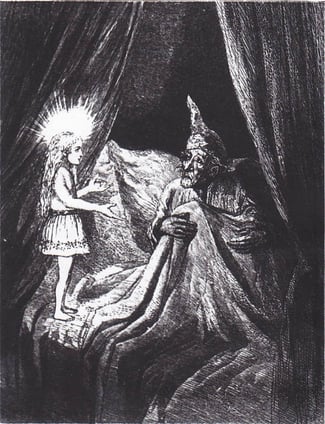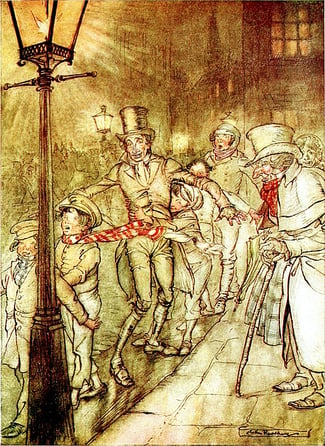“‘There are many things from which I might have derived good, by which I have not profited, I dare say,’ returned the nephew. ‘Christmas among the rest. But I am sure I have always thought of Christmas time, when it has come round—apart from the veneration due to its sacred name and origin, if anything belonging to it can be apart from that—as a good time; a kind, forgiving, charitable, pleasant time; the only time I know of, in the long calendar of the year, when men and women seem by one consent to open their shut-up hearts freely, and to think of people below them as if they really were fellow-passengers to the grave, and not another race of creatures bound on other journeys. And therefore, uncle, though it has never put a scrap of gold or silver in my pocket, I believe that it has done me good, and will do me good; and I say, God bless it!‘”
—A Christmas Carol by Charles Dickens
In 1843, six days before Christmas, Charles Dickens released the well-known novella “A Christmas Carol.” The story follows a greedy old man, Ebenezer Scrooge, as three ghosts visit him.
In Shakespearean fashion, the classic expanded the English language by giving us a new term for a miserable person: “scrooge.” Especially around the holidays—when we put up our Christmas Trees early or hear festive Christmas songs in the grocery store—the overly joyful person can be heard turning to their less enthusiastic friend and saying, “Don’t be such a Scrooge!”
In popular culture, “A Christmas Carol” has been reproduced in hundreds of adaptations. From center stage to television, most people have their favorite version. Some prefer the classic takes like the heart-warming “Scrooge,” produced in 1951. Others prefer cozy animated versions like “Mickey’s Christmas Carol,” which aired in 1983. And some prefer the impressive theatrical versions like the 2009 “A Christmas Carol,” which stars Jim Carry as both Ebeneezer Scrooge and the three visiting spirits.
Many find the classic a Christmas staple—especially when watched or read beside a crackling fire with loved ones. But what about the biblical underpinnings we often overlook? Dickens himself claimed to be a Christian writer, and his Christmas masterpiece is an excellent representation of that sentiment.
Opening with an Important Death
The opening of “A Christmas Carol” is “Marley was dead, to begin with. There is no doubt whatever about that.” Dickens continues with, “This must be distinctly understood, or nothing wonderful can come of the story I am going to relate.” The start of Ebenezer’s story does not begin with him. Dickens makes sure his readers know that.
%2c_opposite_25_-_BL.jpeg?width=325&height=451&name=Marleys_Ghost_-_A_Christmas_Carol_(1843)%2c_opposite_25_-_BL.jpeg) Marley's Ghost by John Leech / Public domain, via Wikimedia Commons
Marley's Ghost by John Leech / Public domain, via Wikimedia Commons
Ebenezer Scrooge’s story of redemption hinges on the fact that even before the audience is introduced to him, his story begins with the death of Marley, just like our story of redemption begins with the death of Jesus Christ (and His Resurrection).
But aren’t we talking about a Christmas story?
Yes.
The beauty that comes from the amazing birth of Baby Jesus can only be fully grasped by those who comprehend the importance of what happened between Good Friday and Easter Sunday, just as readers cannot fully appreciate the redemption and repentance of Ebenezer Scrooge if they fail to recognize the great importance of Marly’s death.
Theme: Biblical Symbolism in the Names of Scrooge and Cratchit
Ebenezer Scrooge and Bob Cratchit also carry biblical symbolism throughout “A Christmas Carol.”
Let us begin with the latter: Bob Cratchit. Before we simply glance over his first name, the name “Bob” also carries meaning, though not biblical. Still used today, the term “bob” is Victorian British slang for a shilling. Dickens uses this symbolism to point out how little he made (and still supported his big family) with only “but fifteen ‘bob’ a week himself.” Now, we shall look at his last name.
_(14593231638).jpeg?width=325&height=430&name=A_Christmas_carol_(1900)_(14593231638).jpeg) A Christmas Carol from Internet Archive Book Images / No restrictions, via Wikimedia Commons
A Christmas Carol from Internet Archive Book Images / No restrictions, via Wikimedia Commons
The Cratchit family is the only character to get the best eating scene. While it is very humble in portions, their feast contains roast goose, mashed potatoes, plum pudding, and gin punch. It is a vivacious scene. Their name is a spin on the English word “cratch,” which means to “eat heartily.” A “cratcher,” then referenced a “hearty eater.” But the symbolism comes along with both words being a variation of the word “cratch,” which comes from the old French term “creche,” which referenced where animals eat from: a manger.
“And she gave birth to her firstborn son and wrapped him in bands of cloth and laid him in a manger, because there was no place in the guest room.”
—Luke 2:7
The name Ebenezer also carries biblical symbolism. In the Books of Samuel, “Eben-Ezer” is mentioned as the location of a battle between the Israelites and the Philistines. Samuel prayed for God’s protection during the battle, and He answered: the Philistines retreated back to their own lands.
“Then Samuel took a stone and set it up between Mizpah and Jeshanah, and named it Ebenezer; for he said, ‘Thus far the Lord has helped us.’”
—1 Samuel 7:12
Ebenezer, then, is a stone that is set up as a reminding monument—set up by the receiver—that retells the help given by God. As a result, his name alludes to the fact that Dickens wants his readers to understand that God is the helper and Ebenezer will be the vessel.
Theme: Tiny Tim and Christian Suffering & Mercy
Children are often used as vessels to tell the truth and to point out what the adult mouth rarely voices. It is not uncommon to see a child who is experiencing suffering have a brighter outlook than their adult counterparts. This is primarily due to their innocence and how they tend to view their circumstances through a simpler lens.
Tiny Tim is no exception.
The incredibly enduring character of Tiny Tim suffers from ailments that Dickens never quite explains. The audience simply knows that he bears crutches, is sick, and, well, tiny.
His sickness has been debated among scholars for centuries and has never been answered. There are theories of cerebral palsy, polio, and tuberculosis. Many theories go back and forth on if it was genetic, environmental, or a combination of both. However, there is one thing everyone can agree on about Tiny Tim’s ailments: his life depends on Scrooge changing his selfish ways.
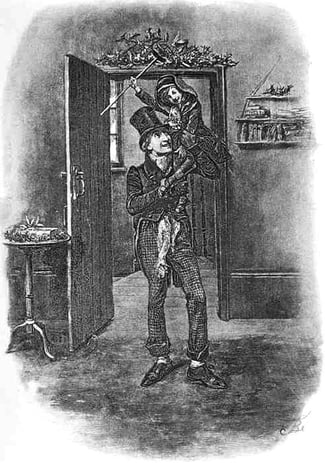 Bob Cratchit and Tiny Tim by Fred Barnard, Public domain, via Wikimedia Commons
Bob Cratchit and Tiny Tim by Fred Barnard, Public domain, via Wikimedia Commons
Beyond Tiny Tim’s circumstances regarding Ebenezer, it serves as a heartbreaking reminder of the power of Jesus Christ. Bob Cratchit, Tiny Tim’s father, after returning from church, is talking to his wife. He tells her:
“Somehow he gets thoughtful, sitting by himself so much, and thinks the strangest things you ever heard. He told me, coming home, that he hoped the people saw him in the church, because he was a cripple, and it might be pleasant to them to remember upon Christmas day who made lame beggars walk, and blind men see.”
Tiny Tim represents someone who has not been given one of Jesus’ miracles but instead needs the mercy of Ebenezer. But yet, he still understands the beauty and awe of His miracles. Something Dickens also wants his audience to comprehend.
Theme: The Ghosts as Christian Allegory
Charles Dickens has been quoted as calling “A Christmas Carol” his “ghostly little book.” Fitting, as we are presented with four important ghosts throughout the tale.
First, there is the ghost of Marley—whose death is told at the beginning (a biblical symbolism noted above) and who had the first visit to Scrooge foretelling the visitation of the next three ghosts.
The next three ghosts (the Ghost of Christmas Past, the Ghost of Christmas Present, and the Ghost of Christmas Yet to Come) represent the Holy Trinity—The Father, The Son, and the Holy Spirit. They allude to God, who is not constrained by time, controls death and life, and is the beginning and end of everything.
Beyond the ghosts' symbolism, there is also symbolism to be taken from their descriptions.
The Ghost of Christmas Past is described as an ephemeral spirit with light coming from the top. Here we have a ghost that can shapeshift from old to young, reminiscent of a God transcending time. We also have a note that the ghost is beaming with light (from the top of its head) to represent a God that brought light into the world. Going further into the light analogy, we are told that His word will light our paths—if we listen to him as Scrooge is to listen to the Ghost of Christmas Past.
Ghost Christmas Past by Sol Eytinge Jr. (1868), Public domain, via Wikimedia Commons
The Ghost of Christmas Present is described as a joyful and positive presence. Much like how, if we allow it to be, the presence of God fills our lives with positivity and joy. An analogy that is so simple it needs no further explanation.
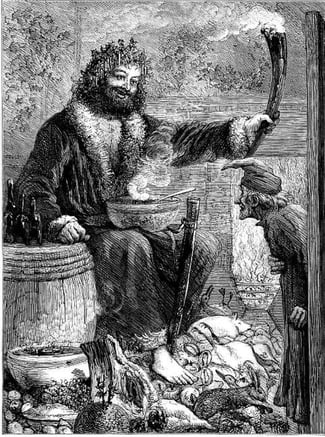 Ghost of Christmas Present by Sol Eytinge Jr. (1869) / Public domain, via Wikimedia Commons
Ghost of Christmas Present by Sol Eytinge Jr. (1869) / Public domain, via Wikimedia Commons
The Ghost of Christmas Yet to Come is described as an ominous and dark spirit. The description of the final ghost reminds us that God, while with us, is still so far above us that He indeed does work in mysterious ways. Also, an encounter with Him can be unsettling and even dark in nature.
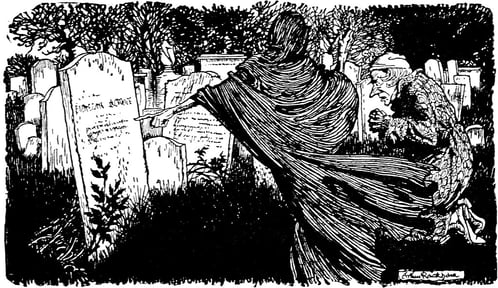 A Christmas Carol by Rackham / Public domain, via Wikimedia Commons
A Christmas Carol by Rackham / Public domain, via Wikimedia Commons
Dickens masterfully weaved intricate descriptors of God into all of His Ghost. Leading one to think that he should have called it his “Godly and ghostly little book.”
Quotes and Themes: Spiritual Lessons & Christian Morality in A Christmas Carol
When we live a life of sin, we live in darkness. We do not prosper from His Divine Mercy or the light He gives us. All our earthly vices and cravings are temporary, and never promised—wealth, beauty, and fame are all fleeting. So, may we remember that greed was almost Ebenezer’s downfall, and may we strive to do better for us and those around us.
“His wealth is of no use to him. He don’t do any good with it. . . . I am sorry for him; I couldn’t be angry with him if I tried. Who suffers by his ill whims! Himself, always.”
The holiday season offers us many moments of contemplation. It is easy for us to allow the mistakes of the last year—or lifetime—to cloud our knowledge of our ability to change. If we dwell in regret, we will not be able to bask in the beauty of the gift of being able to alter our ways to serve us better, our fellow man, and God. So may we remember Marley’s wisdom that came too late and begin seizing the opportunity that lies ahead.
“No space of regret can make amends for one life’s opportunity misused!”
Life often surrounds us with a lot of noise. Noise in the form of obligation, struggle, and even joyful happiness. We must remember during these loud times—usually in the form of Christmas chaos this time of year—to find moments of peace and quiet to reflect. So may we remember Dickens’ sweet reminder to reflect and allow gratitude into our hearts.
“Reflect upon your present blessings—of which every man has many—not on your past misfortunes, of which all men have some.”
Jesus was born for us, and He died for us. The salvation we receive as a consequence is something we must carry with us every day. To find a way to carry Him in our hearts always, during good times and bad. So, may we remember the change of Ebenezer Scrooge when we fall short of honoring our salvation.
“I will honour Christmas in my heart, and try to keep it all year. I will live in the Past, the Present, and the Future. The Spirits of all Three shall strive within me. I will not shut out the lessons that they teach!”
During the holiday season, it is easy for us to get caught up in the hustle and bustle of life and miss opportunities to extend mercy. We buy our gifts and wait in long lines to buy our Christmas hams, but look past the mother who didn’t see her child’s pacifier fall to the floor. We don’t want to fish out the change in the bottoms of our pockets or purses, so we look at the ground as we shuffle by the donation bins. So, may we turn to the words of Marley when we fall short of extending mercy this holiday season or during any moment of life.
″‘Business!’ cried the Ghost, wringing its hands again. ‘Mankind was my business. The common welfare was my business; charity, mercy, forbearance, and benevolence, were, all, my business. The dealings of my trade were but a drop of water in the comprehensive ocean of my business!‘”
The End
“A Christmas Carol” leaves its readers with many lessons—most of which have biblical symbolism. On almost any page (or in any scene), the audience can find applicable quotes to their life and the bible.
A Christmas Carol by Rackham / Public domain, via Wikimedia Commons
But the most important moment in the story is not one that requires deep thought and research. No need to understand root words or deep biblical moments. It is simple but powerful. It reminds us that God’s gifts do not belong to just those who are of faith or kindness but also to those who are faithless and sinful—an all-loving God loves all: “And so, as Tiny Tim observed, ‘God bless Us, Everyone!’”
*Originally published 12/5/22


